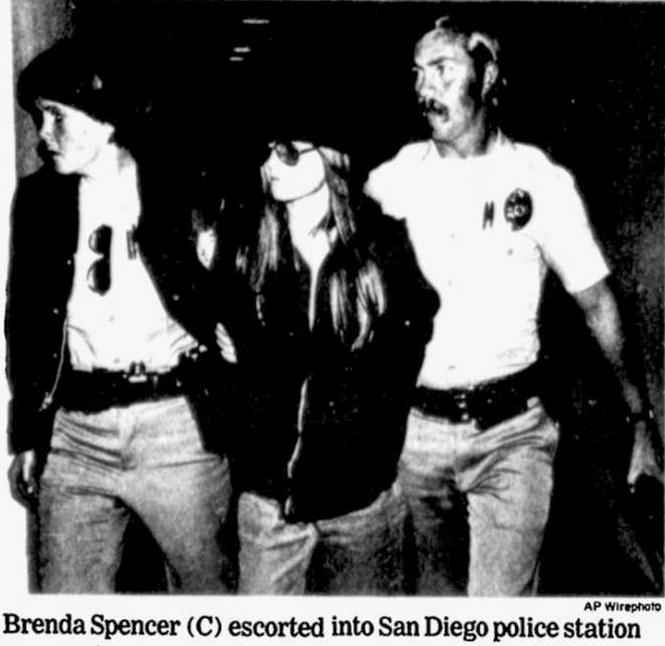It's a story that shook America to its core back in 1979. Brenda Spencer, a 16-year-old girl from San Diego, made headlines for a horrifying act that left the nation bewildered. Her parents, key figures in this dark chapter, have always been shrouded in mystery. So, who exactly are Brenda Spencer's parents, and what role did they play in shaping one of America's earliest school shootings? Let's dive into the details.
This isn't just another crime story. It's about understanding the people behind the headlines, the dynamics of a troubled family, and the impact of their environment. As we explore Brenda Spencer's parents, we'll uncover how their actions—or lack thereof—might have contributed to one of the most infamous events in American history.
By the time you finish reading this, you'll have a clearer picture of not only the parents but also the societal factors that might have pushed a young girl to commit such a heinous act. Let's get started.
Biography of Brenda Spencer
Before we delve into her parents, it’s crucial to understand Brenda Spencer herself. Born on July 11, 1962, in San Diego, California, Brenda grew up in what seemed like an average American household. However, her childhood was anything but ordinary. Early signs of trouble began to emerge as she grew older, with reports of behavioral issues and a troubled home life.
Her infamy began on January 29, 1979, when she opened fire on children and staff at Grover Cleveland Elementary School from her bedroom window. The event left two people dead and eight others injured. The chilling question that everyone asked was, "Why?"
Parents of Brenda Spencer: A Closer Look
Now, let's turn our attention to Brenda Spencer's parents, whose influence played a significant role in her life. Understanding them can shed light on the events that transpired that fateful day.
Who Are Brenda Spencer's Parents?
Brenda Spencer's parents are Carleton Spencer, her father, and his wife, whose name remains less prominent in public records. Carleton, a former Marine and later a real estate broker, had a complicated relationship with his daughter. Reports suggest that his strict and sometimes abusive nature contributed to the family's volatile environment.
His wife, though less documented, was described as a quiet and submissive figure in the household. Together, they created a home atmosphere that many experts believe was a breeding ground for Brenda's violent tendencies.
Carleton Spencer: The Father Figure
Carleton Spencer was more than just a father; he was a disciplinarian. Known for his rigid rules and harsh punishments, Carleton’s parenting style left a lasting impact on Brenda. His military background and insistence on discipline often clashed with Brenda's rebellious nature, leading to frequent conflicts.
- Former Marine and real estate broker
- Known for strict and sometimes abusive behavior
- Had a tumultuous relationship with Brenda
Impact of Parenting on Brenda Spencer
The parenting style of Brenda Spencer's parents, particularly Carleton, had a profound effect on her. Growing up in a household where physical and verbal abuse were common, Brenda learned to express herself through anger and violence. This environment likely contributed to her decision to carry out the school shooting.
Experts in psychology and criminology have long studied the correlation between abusive parenting and violent behavior in children. In Brenda's case, the evidence points to a direct link between her upbringing and her actions.
Psychological Effects of Parenting
Psychological studies suggest that children raised in abusive environments often struggle with emotional regulation and impulse control. For Brenda, these struggles manifested in extreme ways, culminating in the tragic events at Grover Cleveland Elementary School.
- Abusive environments lead to emotional instability
- Children may develop violent tendencies as a coping mechanism
- Parental influence can shape a child's perception of the world
Family Dynamics and Their Role
The dynamics within Brenda Spencer's family were anything but healthy. With Carleton's domineering presence and his wife's passive role, Brenda found herself in a household where communication was stifled and emotions were suppressed. This lack of open dialogue and understanding likely exacerbated her issues.
Family therapy experts emphasize the importance of healthy communication and emotional support in raising well-adjusted children. In the case of the Spencers, these elements were sorely lacking.
Communication Breakdown
The breakdown in communication within the Spencer household was evident. Instead of addressing Brenda's behavioral issues constructively, Carleton resorted to punishment, further alienating his daughter. This cycle of punishment and alienation only served to deepen Brenda's resentment and anger.
Social and Environmental Factors
Beyond the family dynamics, external factors also played a role in shaping Brenda's behavior. Growing up in a neighborhood plagued by poverty and crime, Brenda was exposed to a world where violence was normalized. This environment, combined with her tumultuous home life, created a perfect storm of circumstances that led to her violent outburst.
Sociologists argue that community support and positive role models can mitigate the effects of a troubled home life. Unfortunately, Brenda lacked these crucial elements during her formative years.
Community Influence
The community in which Brenda grew up was not conducive to fostering positive development. High crime rates and limited resources meant that children like Brenda often fell through the cracks. Without the necessary support systems in place, she was left to navigate her struggles alone.
Legal and Psychological Aftermath
Following the shooting, Brenda Spencer was sentenced to 25 years to life in prison. Her parents, particularly Carleton, faced scrutiny and criticism for their role in her upbringing. While they never publicly accepted responsibility, the events of that day forever changed their lives.
Psychologically, the impact on Brenda's parents was significant. Carleton reportedly struggled with guilt and regret, though he never publicly acknowledged his role in shaping his daughter's violent tendencies.
Public Perception and Media Coverage
The media frenzy surrounding the case painted Brenda Spencer's parents in a negative light. Headlines often blamed them for their daughter's actions, fueling public outrage. While some saw them as culpable, others argued that the blame should not solely rest on their shoulders.
Lessons Learned from Brenda Spencer's Story
Brenda Spencer's story serves as a cautionary tale about the importance of parenting, community support, and mental health resources. By examining her case, we can gain insights into how to prevent similar tragedies in the future.
Education and awareness are key components in addressing the root causes of violence. By fostering environments where children feel safe and supported, we can help them develop into well-adjusted adults.
Preventing Future Tragedies
To prevent future tragedies, society must focus on:
- Improving access to mental health resources
- Promoting positive parenting practices
- Building supportive communities
Conclusion
In conclusion, Brenda Spencer's parents played a pivotal role in shaping the events that led to the infamous school shooting. While Carleton Spencer's strict and sometimes abusive parenting style was a significant factor, external influences such as community and environment also contributed to Brenda's violent tendencies.
As we reflect on this tragic case, let us remember the lessons it teaches us. By prioritizing mental health, fostering open communication, and supporting our communities, we can work towards a safer and more compassionate society. Share your thoughts in the comments below, and don't forget to explore other articles on our site for more insights into important social issues.
Table of Contents
- Biography of Brenda Spencer
- Who Are Brenda Spencer's Parents?
- Carleton Spencer: The Father Figure
- Impact of Parenting on Brenda Spencer
- Psychological Effects of Parenting
- Family Dynamics and Their Role
- Communication Breakdown
- Social and Environmental Factors
- Community Influence
- Legal and Psychological Aftermath
- Public Perception and Media Coverage
- Lessons Learned from Brenda Spencer's Story
- Preventing Future Tragedies


